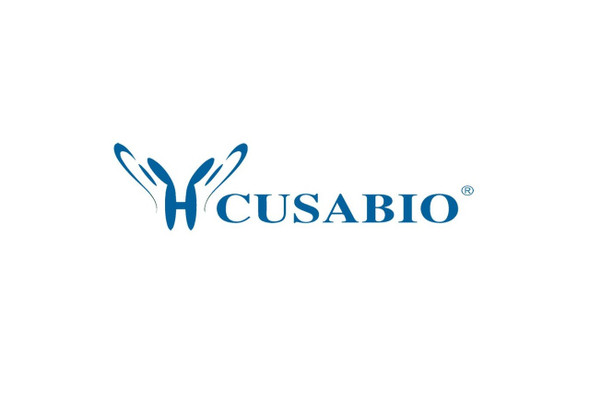Cusabio Active Proteins
Recombinant Mouse Kit ligand (Kitlg), partial (Active) | CSB-AP004071MO
- SKU:
- CSB-AP004071MO
- Availability:
- 5 to 10 Working Days
Description
Recombinant Mouse Kit ligand (Kitlg) ,partial (Active) | CSB-AP004071MO | Cusabio
Protein Description: Partial
Alternative Name (s) : Kit ligand;Hematopoietic growth factor KL;Mast cell growth factor;MGF;Steel factor;Stem cell factor;SCF
Gene Names: Kitlg
Research Areas: Immunology
Species: Mus musculus (Mouse)
Source: E.coli
Tag Info: Tag-Free
Expression Region: 26-189aa
Sequence Info: KEICGNPVTDNVKDITKLVANLPNDYMITLNYVAGMDVLPSHCWLRDMVIQLSLSLTTLLDKFSNISEGLSNYSIIDKLGKIVDDLVLCMEENAPKNIKESPKRPETRSFTPEEFFSIFNRSIDAFKDFMVASDTSDCVLSSTLGPEKDSRVSVTKPFMLPPVA
Biological Activity: The ED50 as determined by the dose-dependent stimulation of TF-1 cells is less than 10 ng/ml.
MW: 18.4 kDa
Purity: Greater than 95% as determined by SDS-PAGE.
Endotoxin: Less than 1.0 EU/µg as determined by LAL method.
Relevance: Mouse stem cell factor (SCF) , is the ligand for the receptor-type protein-tyrosine kinase KIT. It plays an essential role in the regulation of cell survival and proliferation, hematopoiesis, stem cell maintenance, gametogenesis, mast cell development, migration and function, and in melanogenesis. KITLG/SCF binding can activate several signaling pathways. It also promotes phosphorylation of PIK3R1, which is the regulatory subunit of phosphatidylinositol 3-kinase, and subsequent activation of the kinase AKT1. KITLG/SCF and KIT also transmit signals via GRB2 and activation of RAS, RAF1 and the MAP kinases MAPK1/ERK2 and/or MAPK3/ERK1. KITLG/SCF and KIT promote activation of STAT family members STAT1, STAT3 and STAT5.
PubMed ID:
Notes: Repeated freezing and thawing is not recommended. Store working aliquots at 4℃ for up to one week.
Function: Ligand for the receptor-type protein-tyrosine kinase KIT. Plays an essential role in the regulation of cell survival and proliferation, hematopoiesis, stem cell maintenance, gametogenesis, mast cell development, migration and function, and in melanogenesis. KITLG/SCF binding can activate several signaling pathways. Promotes phosphorylation of PIK3R1, the regulatory subunit of phosphatidylinositol 3-kinase, and subsequent activation of the kinase AKT1. KITLG/SCF and KIT also transmit signals via GRB2 and activation of RAS, RAF1 and the MAP kinases MAPK1/ERK2 and/or MAPK3/ERK1. KITLG/SCF and KIT promote activation of STAT family members STAT1, STAT3 and STAT5. KITLG/SCF and KIT promote activation of PLCG1, leading to the production of the cellular signaling molecules diacylglycerol and inositol 1,4,5-trisphosphate. KITLG/SCF acts synergistically with other cytokines, probably interleukins.
Involvement in disease:
Subcellular Location: Isoform 1: Cell membrane, Single-pass type I membrane protein, SUBCELLULAR LOCATION: Isoform 2: Cytoplasm, Cytoplasm, cytoskeleton, Cell membrane, Single-pass type I membrane protein, Cytoplasm, cytoskeleton, Cell projection, lamellipodium, Cell projection, filopodium, SUBCELLULAR LOCATION: Soluble KIT ligand: Secreted
Protein Families: SCF family
Tissue Specificity: Expressed in the cochlea.
Paythway:
Form: Lyophilized powder
Buffer: Lyophilized from a 0.2 μm filtered 1xPBS, pH 7.4
Reconstitution: We recommend that this vial be briefly centrifuged prior to opening to bring the contents to the bottom. Please reconstitute protein in deionized sterile water to a concentration of 0.1-1.0 mg/mL.We recommend to add 5-50% of glycerol (final concentration) and aliquot for long-term storage at -20℃/-80℃. Our default final concentration of glycerol is 50%. Customers could use it as reference.
Uniprot ID: P20826
Uniprot Entry Name:
HGNC Database Link: N/A
UniGene Database Link: UniGene
KEGG Database Link: KEGG
STRING Database Link: STRING
OMIM Database Link: N/A









